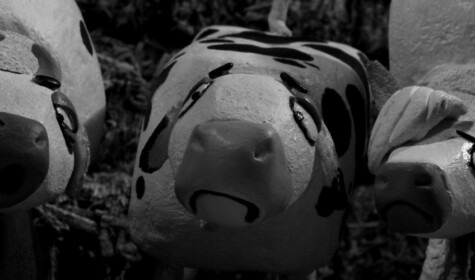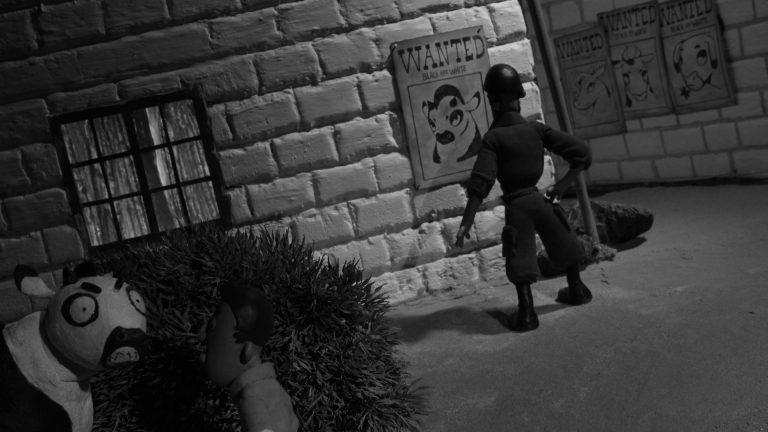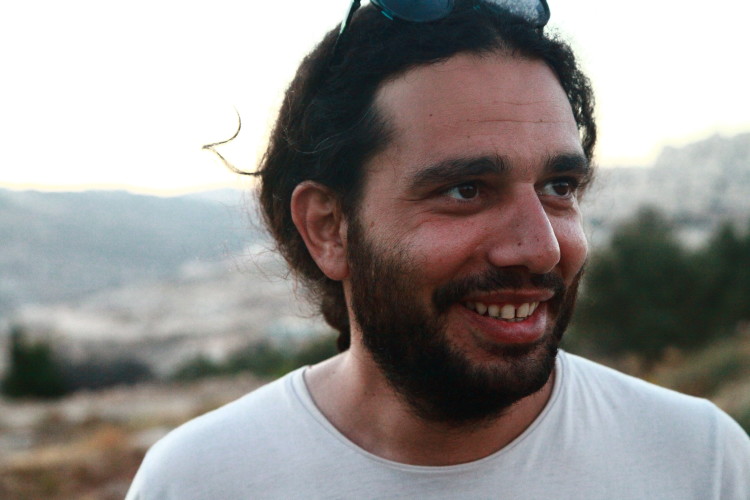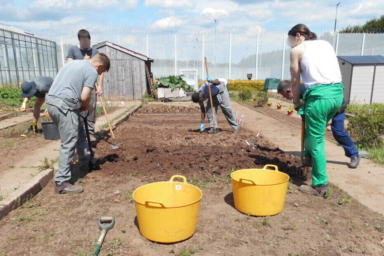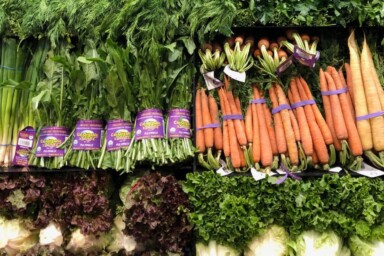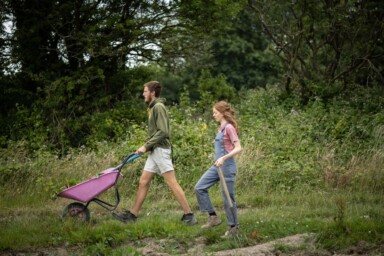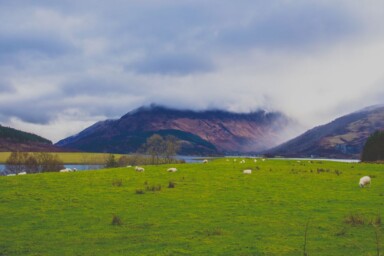So what actually happened in Beit Sahour? And why were these cows labelled a security threat? At that time all of the community’s food was coming from Israel. As part of resistance to the occupation, the Agricultural Neighbourhood Committee in Beit Sahour decided to produce their own milk, and bought 18 cows from an Israeli kibbutz. “The moment I saw the cows at our farm I felt we had started to realise our dream of freedom and independence,” Jalal Oumsieh, a school teacher who bought the cows, says in the film. There were several glitches along the way, not least the fact that none of them had any experience with cows. “We didn’t know what to do, we were astonished!” says Jalal, recalling their attempts to herd the cows from the trailer to their barn.
Eventually, however, they got to grips with milking and were able to deliver milk to the community. The cows became a central feature of the community and the farm became a focal point and picnic place with ‘victory’ gardens, chickens and rabbits. As local farmer Naji Musleh says, “We succeeded in having a movement towards national self-sufficiency. Every person who owned a piece of land, no matter how big or how small, started growing tomatoes and beans.” Elias Rishmawi, a local pharmacist, remembers that, “The whole society was in total harmony.”
But it did not last. There was fear in Israel that this level of community organisation and resistance could spread. One day the Israeli military turned up and said the cows must be gone within 24 hours or the farm would be bulldozed. The community hid the cows, which led to a military search for the ‘18 terrorists’. Those hiding the animals were afraid of the soldiers, but they saw it as a matter of national interest and their duty to keep the cows hidden. Throughout the 12-day curfew imposed on the town, the ‘Intifada’ milk was delivered in secret. This was very important, according to doctor Majed Nassar, not just as a source of food but because, “The notion that these cows were able to produce milk during the curfew and this milk was distributed among the people, gave the people a very strong sense of what they were doing.”
The story of the 18 cows ended with the Oslo Peace Accords of 1993 – an agreement between the Israeli government and the Palestinian Liberation Organization, which many Palestinians saw as a betrayal by their leadership. Filmmaker Amer Shomali believes the agreement made it even harder for Palestinians to be self-sufficient. Speaking to the Sustainable Food Trust he said, “Do you know that, according to the agreements signed, we are not allowed to import seeds?! We are doomed to be consumers and not producers… and slaves for ever.” But, despite this, Shomali also sees great hope through the story of the Beit Sahour cows. One of the reasons he created the film was to relive the pride and dignity felt by everyone during that time, and “to be reminded that they can do it again, that it almost worked 25 years ago and it can work this time. In the end, what the film gave me and others is hope.”
This strong community spirit spurred on by agricultural independence and self-sufficiency is very much still alive in Palestine today. I recently attended a talk given by Mohammad Irsheid, a Palestinian farmer, and Taysir Arbasi, the Palestinian director of Zaytoun, a cooperative selling Palestinian products. They spoke about the hardships suffered under occupation, particularly the loss of land to illegal settlements. But they also spoke about the rise in farm cooperatives and the Palestine Fair Trade Association, which now has 1,700 farmers. Of these members, 1,200 are certified organic.
One of the aims of such cooperatives is to support the resilience of farmers under occupation. Arbasi explained that people must stay on their land and continue to farm because if they lose their livelihoods then they lose hope. Farming allows people to sustain themselves independently. As with the Beit Sahour cows, Palestinians have become increasingly imaginative in developing ways to carve a living from diminishing resources and, despite severe restrictions, continue to provide for the community and even sell to foreign markets.
But this story resonates much farther afield than Palestine. It should remind us of how important it is to have control over the source of our own food. This is a freedom that people worldwide should fight to recover, as much of our food no longer comes from publicly traceable sources. At the same time we can draw inspiration from Palestinian farmers and the way Palestinians value food and farming. With an emphasis on community involvement, smallholdings and backyard farming, it is a far cry from the agro-industry and supermarket domination we have here in Britain and many other countries.
The Wanted 18 is a film about resistance and hope. It highlights the basic human right of food security and autonomy, and ultimately this is important to us all.
Q&A with filmmaker Amer Shomali
What made you decide to make a film about this story? What do you hope to convey to people watching the film?
My selfish motivation was to have the chance to live the beautiful energetic time of the Palestinian Intifada, which I missed while living as a refugee in Syria. Through making this film and meeting the characters (heroes) of its story over the past five years, recreating their stories on camera, I wanted to be among them through this film… a window to the past. To my surprise the Palestinian audience wanted the same thing – even those from the older generation who lived it. They wanted to live this pride again, to feel dignity, to be reminded that they can do it again, that it almost worked 25 years ago and it can work this time. In the end, what the film gave me and others is hope.
